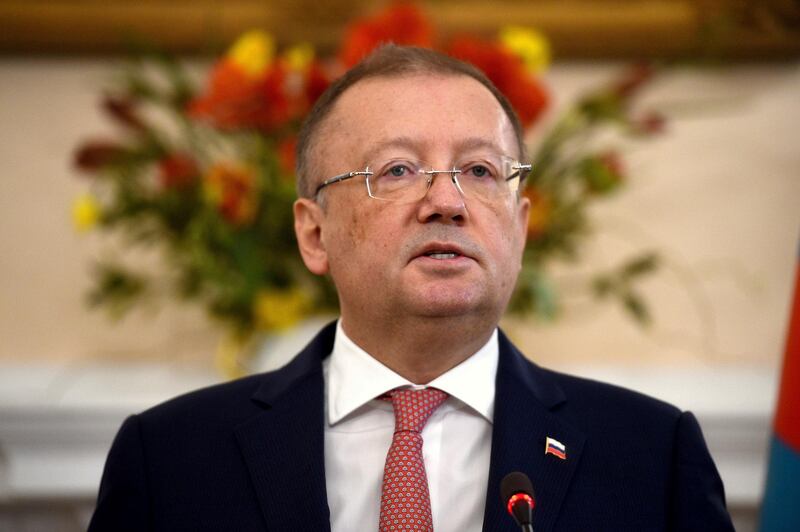Britain has offered no proof of Moscow's involvement in a chemical attack in Salisbury and cannot be trusted to investigate the poisoning of former double agent Sergei Skripal, Russian ambassador Alexander Yakovenko told reporters in London on Thursday.
While Theresa May has accused Russia of a "brazen and reckless attack" on Skripal and his daughter Yulia with a military-grade nerve agent, Mr Yakovenko denied any Kremlin links.
"We were blamed on a very serious matter and for us it is very important to understand all the details and get the answers for all the questions," Mr Yakovenko said.
Britain has so far refused Russian consular assistance, has not answered questions about the Skripals' medical condition, and has not shared any evidence of Russia's involvement, he said.
"We can’t take British words for granted," Mr Yakovenko said. "History shows that British statements must be verified. We demand full transparency of the investigation and full cooperation with Russia" and the Organisation for the Prohibition of Chemical Weapons.
The ambassador risked inflaming London-Moscow tensions by wishing the victims a "speedy recovery" and making light of the attempted murders by saying events were so complicated it would take someone like fictional detective Hercule Poirot to solve the crime.
Skripal and his daughter remain unconscious and hospitalised in critical but stable condition. A judge gave permission on Thursday for blood samples to be taken from the Skripals so tests can be carried out by chemical weapons experts. The court ruling was made after a hearing in the Court of Protection, as neither Mr Skripal, 66, nor his 33-year-old daughter, were able to give their consent.
Detective Sergeant Nick Bailey, who tried to help the Skripals following the March 4 attack, has been discharged from the hospital. He called the experience "surreal" in a written statement.
The British prime minister has challenged President Vladimir Putin to explain how a Russian-made nerve agent was used on British soil. On Thursday she said it was "clear the Russian threat does not respect borders".
_____________
Read more
[ Theresa May tells allies to beware Russia, urges them to expel Putin's spies ]
[ ‘No antidote’ to Novichok so spy will die, says Russian scientist ]
[ Expelled Russian diplomats fly home from UK in spy poison stand-off ]
_____________
Mrs May was in Brussels preparing for an EU meeting where she will urge leaders to unite against Russia in the wake of the Salisbury nerve agent attack. She is expected to provide an update on the chemical attack and warn leaders that Vladimir Putin's flouting of international law is a threat to all EU democracies.
May told reporters that she would be talking to her counterparts about Russia’s “pattern of aggression”, not just the isolated attack earlier this month in the UK.
"Russia staged a brazen and reckless attack against the United Kingdom," May said. "It's clear that the Russian threat does not respect borders and indeed the incident in Salisbury was a pattern of Russian aggression against Europe and its near neighbours."
Greek Prime Minister Alexis Tsipras, who tweeted his congratulations to Vladimir Putin on his re-election on Sunday, was non-committal about his position on the poisoning incident as he arrived in Brussels on Thursday.
“We need to investigate Salisbury event with great responsibility," Alexis Tsipras said.
Lithuanian President Dalia Grybauskaite indicated that he expected EU leaders to weigh their options. Asked about the possibility that the bloc will agree to booting out Russian officials from their own countries, President Grybauskaite said “all of us, we are considering.”
Meanwhile, Finnish President Sauli Niinisto congratulated the Russian president on his election victory for the second time in the space of three days on Thursday during a phone call between Helsinki and Moscow. Finland and Russia share a 1,300-kilometre (800-mile) border.
The diplomatic tension between the UK and Russia was ratcheted up on Wednesday when British Foreign Secretary Boris Johnson suggested Vladimir Putin was hoping for a propaganda boost from this summer's World Cup, similar to the one Hitler wanted from the 1936 Berlin Olympics.
Mr Johnson agreed with an MP who suggested, "Putin is going to use it in the way Hitler used the 1936 Olympics", as a propaganda exercise.
Mr Yakovenko condemned those comments during Thursday's press conference, saying: "Nobody has the right to insult the Russian people, who defeated the Nazis and lost more than 25 million people."
The ambassador added that England football fans would be safe at the upcoming 2018 World Cup in Russia despite the diplomatic crisis between London and Moscow.
While experts from the Organisation for the Prohibition of Chemical Weapons arrived in the UK on Monday to check samples from Salisbury, Mr Yakovenko added that the "burden of proof" still lies with British authorities and that "no facts have been officially presented either to the OPCW, or to us, or to UK’s partners, or to the public."
Vladimir Putin has already dismissed the idea that the Russian state was linked to the use of the military-grade nerve agent Novichok, which is manufactured in Russia.






